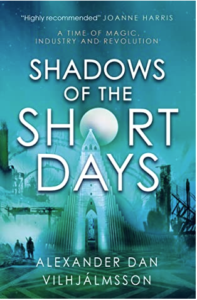Hrimland, an alternate Iceland, sighs under its exploitation by Kalmar, a Nordic union that in history lasted from 1397 to 1523 but extends into the unspecified present of Shadows of the Short Days. Garún feels that exploitation more keenly than most; half human and half huldufólk, she’s an outcast among the oppressed. Worse, she left what little support she could have counted on in the countryside — since it came with a heaping helping of enforced servitude — so she is on her own in the big, walled city of Reykjavik.
The city hides behind Kalmar-built walls because Hrimland is far more filled with magic than Iceland, and that magic is typically much more malevolent. Not that people haven’t found ways to deal with and use the extradimensional forces, from little folk spells and ways all the way to an established school of sorcery. As Shadows of the Short Days opens, Garún’s ex-boyfriend Sæmundur has just gotten himself expelled from that school for refusing to follow the strict protocols of spell working, protocols that, in the school’s view, are the only things that keep magic under control at all and save people who work with it from death, or worse.
Vilhjálmsson conjures up a dark and gritty atmosphere for Reykjavik and Hrimland, a place where many scrape by but only a very few prosper. Humans share the world not only with the huldufólk, who are human-like exiles from another time and place, but also raven-people called náskárar and fish-folk called marbendlar. Vilhjálmsson originally wrote the book in Icelandic, and he translated it into English himself. Some of the linguistic choices he made for the original carry over into the English version. The náskárar speak in a harsh and archaic style, and in scenes involving them Vilhjálmsson retains even more of the original language than he does elsewhere. The meaning is never opaque, but the sense of dealing with another intelligence is unavoidable. Throughout the book, he retains a lot of Icelandic names for things, or words that were also neologisms in the original because they are unique to the fantastic aspects that Vilhjálmsson portrays.
The setting and the atmosphere were, for me, the most effective aspects of Shadows of the Short Days. Reykjavik is confined and close, with portals that lead into a Shadow Downtown that’s even more claustrophobic. Characters mostly find release at bars and parties, with the occasional rock concert and the even more occasional political demonstration.
For Garún is an artist, and she thinks she is also a revolutionary. She’s in touch with other artists and revolutionaries, and they put out an underground newspaper and hope to inspire rebellion against the Crown to replace a patently unjust order with independence and … something. She goes through the book hopped up on righteousness and rage, and seldom leaves that register. Sæmundur is a selfish asshole, heedless of the costs of his pursuit of esoteric knowledge, quite willing to commit murder just to show the uptight know-it-alls who are keeping him down. He, too, seldom leaves that register until at the end of a series of increasingly despicable deeds, the author hands him an apotheosis. The other characters mostly struck me as NPCs, shuffled around to provide the two leads with props, motivation, or sidekicks.
Vilhjálmsson’s Hrimland is a vivid place, established in detail and made to feel real through an accumulation of detail. If he writes again in this setting, as seems likely, I hope to meet characters who are less set from the start, and whose companions feel more like equals with their own weight. Maybe the longer days of a Hrimland summer will shed more of that kind of light.
+++
Doreen’s review is here; she liked Shadows of the Short Days more than I did.

